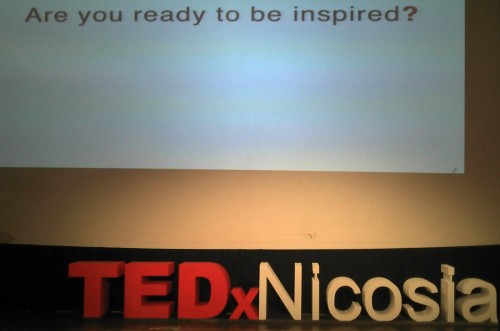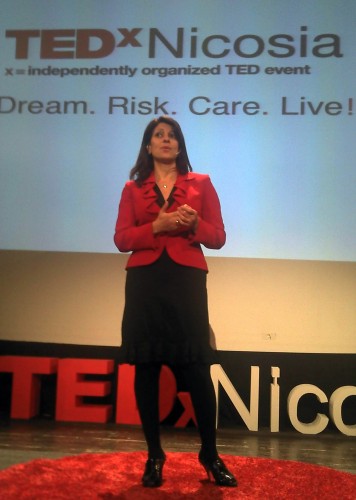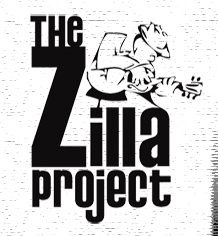As you know, I spent most of the day in Nicosia yesterday, attending TEDxNicosia event together with Michael Stepanov. I’ve mentioned several times in this blog and on Twitter that I was overexcited about this event and my opportunity to actually go there.

Michael picked me up at 8am and drove me to Nicosia. With the new 3 lane section of the highway and a recently learnt shortcut through the Strovolos industrial area, it took us only about an hour to get to University of Nicosia, ex Intercollege campus. Lots of people, lots of cars, gladly huge parking space – everything as expected for a Wednesday morning. As soon as we came through the main entrance we spotted the TEDxNicosia mini-poster directing us downstairs to the Cine Studios.
Even though we weren’t the first ones to show up and with a little queue already waiting for registrations it took us only about 10 minutes to get processed. Name, ticket, badge, goodies baggy, brownie cookie, snapshot in front of the TEDxNicosia logo wall. There was still time before the start of the talks, so we had some of that coffee nicely provided by the even organizers. And a cookie. And some water. And I met someone. Chrys comments frequently on this blog, but we’ve never actually met. Until now. So there, before the talks even started I already got some value out of the event.
And it was time so we finished the coffee and went in to get inspired. The hall was packed. I was sitting in the second row so I could see too well behind me, but for what I could see – there were no spare seats. 150 people or so, video cameras, photo cameras, laptops, and the stage with the traditional red circle of a carpet, cut out 3D letters of the conference logo and a large screen for slides. Everyone was excited, I could feel it in the air.

Marina Theodotou, the founder and curator of the TEDxNicosia gave a brief introduction. She was worried, which is to be expected. I am a bit familiar with event organizations but even I was surprised to learn that the whole thing took around 10 months to organize and that everyone worked pro bono – the event rests on the shoulders of volunteers (and sponsors, of course) and it has no commercial goal in itself.
Then, finally, the talks started. There were a total of eleven of them plus two videos, separated into four sections, by the title of the conference: dream, risk, care, and live. Each of the sections wasn’t necessarily a topic in itself, but rather a focus point or a perspective to a talk. Each and every speaker was interesting and each and every talk was inspirational in its own way. There was something for everyone in every talk.
It is hard to rate the talks or to select the best ones – each one gave me something to think about or taught me something that I didn’t know before. But if you put a gun to my head and told me to choose, I’d have to pick two. Coincidentally, there were the first and the last talks of the event.
The first one was by Nicos Anastasiou. It actually worried me a couple of times. Let me give you some context. Since Cyprus is a multilingual country, I was a bit nervous going to the event, not being sure that everything would be in English. I don’t have anything against Greek – after all it’s one of the official languages – but I don’t really understand it that well. TEDxNicosia website is all English and there was no mentioning of Greek or of any other languages. That gave me hope but not confidence. My other worry was that given that this conference is not of any specific industry, interest, or subject, and that it usually receives plenty of international attention, I thought the issue of divided Cyprus would be raised more than necessary. Again, I don’t have a problem with that, but that wouldn’t be all I was expecting of the event. And here we are. The first talk and the first slide with the title clearly says that it is going to be about the Cyprus problem. That was the first time when I got a bit nervous.
But just a few minutes into it, I realized that there was nothing to worry about. Even though Nicos Anastasiou did indeed speak of the Cyprus problem and divided people, it was very different from anything I ever heard on this subject before. Nicos covered some of his personal experiences and how that brought him into work that he does now with Youth Encounters for Peace (YEP) and other groups of people. I’ve never heard of any of the organizations or projects that he was talking about. I thought that was because I am a foreigner and because I don’t get news in Greek. As I discovered later during the break, not many Cypriots heard of them either. Somehow it all goes on under the radar without much exposure from either politicians or the mass media. And that is sad.
Sad, because the work these people do is really amazing. And Nicos described it in the most excellent way. There were no big words or self promotion, greed or show off. It was quite the opposite. It was very modest, very personal, and very humane. To the point that my second reason for worry started to surface.
Nicos’ talk was very touching and emotional. Given that I cry in most of the drama movies (yeah, I can admit now that pretty much everyone knows it anyway), I started feeling that this was way more powerful and real than a movie. A sip of a water and a look around, and what do I see? There were a lot of eyes around with tears in them. No shame there. As it was the first one of the event and we had hours ahead of us, I was worried for a bit that I won’t be able to handle all of it. Fortunately or unfortunately, but it was the only talk that was that moving.
The last talk of the event was by Myrtani Pieri. She spoke very passionately about the complimentary value of science in understanding and enjoying the beauty of the world. Some of the thoughts I’ve heard before (for example in this interview with Richard Feynman), some I didn’t. But it was not only about the thoughts here. It was about the passion and inspiration with which she spoke. It was mesmerizing, hypnotizing. All I wanted just to hear more and more more.
I consider myself to be a rather passionate person. I have troubles controlling or directing my passion often. But I do not what it is and how it feels and how awesome it is. And when I meet people – on a daily basis – who either have never experienced it (I doubt it actually) or completely and totally forgot what it is (which is more likely), I wish I could give them some of my passion if only just for a moment. I think the world would have been a far better place if more people were more passionate about more things. Even though religious extremists are trying to prove me wrong.
The two talks were very different from each other. But what they had in common was that they were very human. They were about the really important things in our lives – not the jobs or money or social status or fashion or anything like that. They were about basic needs – the need to connect with other humans and the need to know how the world around us works. They were about things that people seek no matter how rich or poor they are or where they live or how old they are.
The other talks weren’t bad. As I said, I took something out of each and every one of them. Aude Marie Auphan spoke of her huge career change from “holding the top job in my profession for 10 years” to an entrepreneurial adventure and her need to integrate her job with her newly acquired parenting responsibilities and her own growth and development. Devrim Celal shared his story of how he became a marathon runner and ran 1,000 kilometers marathon through 4 toughest deserts on the planet. Alexandros Charalambides brought up an important issue of energy – how we use it, what the Mari explosion taught us, what we have to do, and what are the possible ways of doing it. Alexandra Eleptheriou explained how important it is to understand the circumstances when choosing actions. Antonis Petrou got me started on Cyprus marine biology, which I knew absolute nothing about until his talk yesterday. Maria Stylianou shared her rediscovery and redefinition of the world as a parent – something that I went and still going through as well. Viken Tavitian shared his more practical and entertaining approach to sciences than that of the boring textbooks – something that I’ve thought about a lot. From Orestis Tringides I’ve learned about yet another important initiative – Open Cyprus Project (www.accessinfocyprus.eu and www.access-info.org) which is an initiative that promotes access to information for increased government transparency and citizen activism. Angeliki Yiassemides talk had an interesting part on similarities between personal and group psychologies, involving both consciousness and subconsciousness.
Even with brief, 18 minutes in length, talks there was still plenty to learn and think about. Following the TED and TEDx tradition, all of these talks will be published online on the TEDxNicosia website as well as YouTube, as soon as next week. And while there is no way to pass the atmosphere of the event fully into a video, I think a good chunk of it will still be there.
There were also two videos. One I’ve seen a few times before – Steve Jobs’ 2005 Stanford Commencement Address.
[youtube=http://www.youtube.com/watch?v=UF8uR6Z6KLc]
The other one was new to me – a TED talk actually: Raghava KK: Shake up your story.
[youtube=http://www.youtube.com/watch?v=64fDIZiV-SM]
The rest of the event was organized as good as the talks were. The program was followed as timely as it is possible in Cyprus. The catering was very good – with snacks, fruits and refreshments, and even wine and whiskey at the end of the event. There was free and open WiFi network in the auditorium, which, unlike many other conferences, worked like a clockwork. There was excellent photo and video coverage – too early to see it online yet, but I’m sure it will follow next week or so. There were workshops and a “tree of dreams” for those who wanted to participate during the breaks. And plenty of space and opportunity to network and talk with fellow TED-ers. Despite this being the first such even in Cyprus, the organization was top notch – very smooth, very professional.
Even now, a day later, I am still under an impression and my head spins from all that I got at TEDxNicosia. I am very glad I attended and I will definitely do my best to attend all future events (hope there will be more of them). And judging by the looks on other people faces and conversations here and there – everybody really enjoyed it.
Huge thanks are due to the organizers who have worked their butts off month after month to bring us that. You guys have done an amazing job and a standing ovation at the end of the event is just one of the many things that proves it. Please make these events a tradition and I’m sure more and more people will come, get inspired and will change their lives and lives of people around them for the better.


